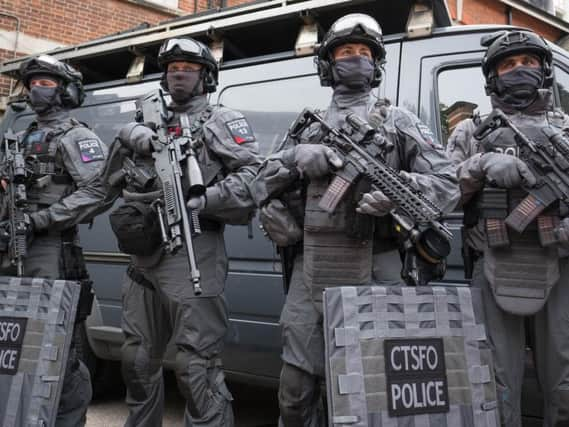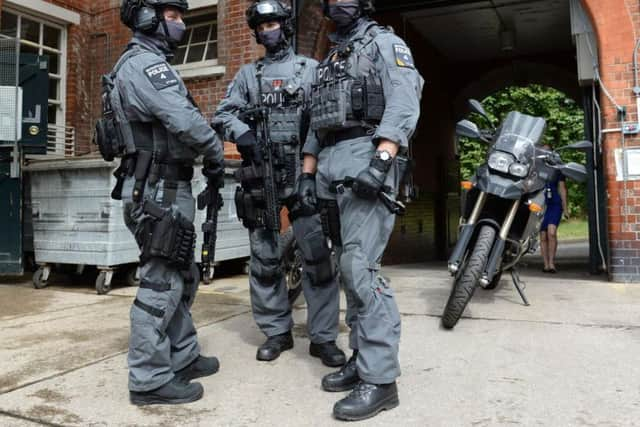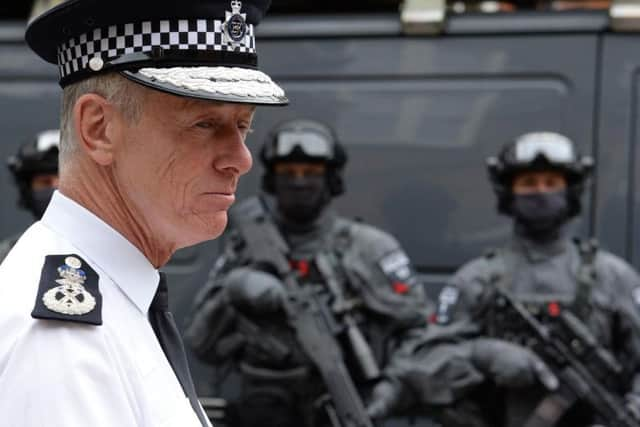Anti-terror marksmen deployed on UK streets - and more will follow


Metropolitan Police chief Sir Bernard Hogan-Howe said the first of the force's additional 600 marksmen, put in place following terror attacks in mainland Europe, are trained and operationally ready.
Officers armed with handguns and semi-automatic weapons, as well as Tasers, will go on routine patrol in the capital.


Advertisement
Hide AdAdvertisement
Hide AdSpeaking in Hyde Park, Sir Bernard said: "People aren't fools - they know that in the event that there is a firearms attack, we are going to have to respond with firearms.
"They pass through airports where we have armed officers, they pass through railway stations where they see firearms.
"In some of our big iconic locations, we've already got armed patrols - if you look at Parliament, Downing Street - so it's not entirely new.
"I think people understand that where you are going to have people as enemies who've got guns, we've got to have guns.


Advertisement
Hide AdAdvertisement
Hide Ad"It's unusual, but it's an entirely rational and reasonable response to make sure that people are aware that we've got the guns, and if we have to use them we've got people well-equipped to do that."
The plans were unveiled on Wednesday as Police Federation chairman Steve White warned that it could take at least two years to get the additional 1,500 firearms officers planned nationally in place.
Some forces are also struggling to get the right quality of volunteers to go through the rigorous selection and training process.
Mr White said: "Some forces are getting volunteers coming forward, but they are not always being selected because they don't meet the criteria. It is vitally important that standards are maintained. The best-case scenario is two years in terms of recruiting an extra 1,500 officers.


Advertisement
Hide AdAdvertisement
Hide Ad"If there is an attack it is unlikely to be an isolated incident. We've got to have the resources around the country because it might happen in multiple places at the same time."
The latest Home Office figures show there were 5,639 authorised firearms officers in forces across England and Wales as of March 31 2016 - down by eight compared with the previous year, when there were 5,647.
It means the number has dwindled by more than 1,000 in the past five years.
National lead for firearms Deputy Chief Constable Simon Chesterman said in July that the majority of new marksmen will be in place by April 2017.


Advertisement
Hide AdAdvertisement
Hide AdIn London, Scotland Yard's existing 2,200 marksmen are being boosted by 600, and the force intends to have "a significant uplift" in place by the end of the year.
Plans to increase the number of armed police were put in place in the wake of attacks including the atrocity in Paris at the end of last year, when 130 people were killed.
Sir Bernard said: "The reality of having to deal with armed and deadly attackers is that you need firearms officers who will use force to stop those attackers in their aim. Our firearms officers are the ones who will run towards the danger. They are our heroes.
"Despite the fact they are carrying guns, they are still police officers, and I want the public to approach and talk to them - they are out on our streets to reassure and help the public.
Advertisement
Hide AdAdvertisement
Hide Ad"Equally important in how we protect our capital is the relationship that our mainly unarmed officers have built with communities over many years. Our communities are a vital source of information and if you have fears or concerns then we want to know."
The Scotland Yard boss wrote a newspaper article on Sunday in which he hailed neighbourhood policing as "our major weapon" in the fight against terrorism.
But Mr White expressed concern over cuts to neighbourhood police teams.
He said: "Chief constables are having to make very difficult decisions in terms of managing their budgets and managing the competing priorities that they have.
Advertisement
Hide AdAdvertisement
Hide Ad"With counter-terrorism there is the top-sliced money and the extra money for firearms officers, but that is once we're having an attack.
"Of course we need them, but we must make sure that we have the relationships built up between local communities and the police service, so that people can ring the police or speak to their bobby on the street and have the confidence to raise things with them.
"If you don't have police officers having that daily contact in these communities you're never going to build these relationships.
"Over the last few years in some force areas they have had to take resources out of neighbourhood policing just to keep the wheels on in terms of reacting to incidents.
Advertisement
Hide AdAdvertisement
Hide Ad"You can't fix this overnight. The resources that have been taken out over the last couple of years is stark."
Experts have said that police in France, which has been hit by a spate of terrorist atrocities, have struggled to contain the threat, partly because of their lack of community relationships.
In London, neighbourhood coverage has been boosted, and on Wednesday mayor Sadiq Khan said each ward will get an additional dedicated constable.
Sir Bernard said: "We need good relationships with the public, we need them to tell us when they're worried about individuals. One of the ways we get that information is you know your local neighbourhood officer.
Advertisement
Hide AdAdvertisement
Hide Ad"We've all faced budgetary cuts and we've all faced some hard decisions. Every force has to make its own decisions, but we've made ours clear."
As well as the armed response teams on public patrol, Scotland Yard has specialist counter-terrorism firearms squads who are on call 24 hours a day. They are trained to operate on water and to abseil, and some teams operate on motorbikes.